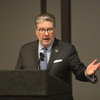New drone bill needs FAA approval
ALBANY COUNTY — Although a newly proposed state law that would ban the intentional use of drones over schools appears on its face to conflict with federal regulations, the Federal Aviation Administration does permit such laws on a case-by-case basis, giving the bill a path forward.
The bill is sponsored in the state senate by Senator Neil Breslin and will soon be sponsored in the Assembly by Assemblywoman Pat Fahy. It was written in response to an Oct. 12 incident where a drone affiliated with a nearby real estate company flew over several schools in the Bethlehem district: the high school and Slingerlands and Eagle elementary schools.
In a statement provided to The Enterprise this week, the FAA suggested that this law would overstep into the administration’s jurisdiction.
“The FAA is responsible for the safety of our National Airspace System. This includes all airspace from the ground up,” the statement read (emphasis theirs). “While local laws or ordinances may restrict where drones can take off or land, they cannot restrict a drone from flying in airspace permitted by the FAA. We prohibit drones from flying over designated national security sensitive facilities like military bases, national landmarks and certain critical infrastructure such as nuclear power plants.”
Upon inquiry, Breslin’s chief of staff, Maureen Centino, told The Enterprise that the law had been drafted at the request of Bethlehem School District and that “inconsistencies” were being discovered.
“We’re probably going to be making some amendments at some point,” she said. “The legislative session doesn’t start until January, so we’ve got plenty of time to look at things and get feedback from people.”
However, Fahy’s spokesman, Alexander Flood, told The Enterprise that the assemblywoman stood by the bill as proposed, referring to a document published by the FAA that says some exceptions will be made for “privacy-related” restrictions over schools, parks, and other areas considered sensitive — though it does not say outright that these laws are permitted in all cases.
Instead, the FAA document says that any such law “would more likely be permissible because of its lesser impact,” relative to, say, a town- or city-wide ban.
“For example,” the document reads, “a privacy-related ban on [Unmanned Aerial Systems, a.k.a. drones] operations over an entire city would very likely be preempted because it would completely prohibit UAS from using or traversing the airspace above the city and impede the FAA’s and Congress’s ability to safely and effectively integrate UAS into the national airspace.”
Elsewhere, the document says, “Restrictions on how UAS are utilized (i.e., conduct) instead of where they may operate in the airspace would more likely be consistent with Federal preemption principles.”
When reached for clarification and questions about the pre-emption process, which is how the FAA overrides conflicting local laws, an FAA spokesperson referred to the same document.
Flood said, “We are discussing exactly this with the FAA.”
Reached after the nuance of the regulations was revealed, Breslin’s legislative director Evan Schneider said that the office was “on a fact-finding mission,” and could not specify the inconsistencies that Centino referenced.
“We don’t know if there are additional issues but we’re going to do some more work, some more research on it — determine what [the inconsistencies] are and what we can potentially do,” he said.
Schneider said the bill was introduced prior to this deeper research because a public bill can be publicized and reviewed by the general public, and the office can “respond accordingly by concerns that are raised.”
Through a spokesperson, Bethlehem Superintendent Jody Monroe told The Enterprise that the bill is necessary to ensure school safety, particularly because the exact threat posed by drones isn’t entirely known at this point.
“Like you, we are also not entirely familiar with what drones can do,” she said. “That is why they pose an unknown threat and why it makes sense that there should be some rules regarding their use around schools ….
“At the same time, we are responsible for protecting student privacy. The use of drones and aerial photography without authorization is an invasion of that privacy. Keep in mind that this incident took place while students and staff were in the building and outside at recess, while a drone hovered above them.
“The fact that there are no laws to help prevent this counters everything we strive to do in the name of safety. If signed into law, a measure like this one could offer a level of protection for schools that does not currently exist.”
One known concern is that drones can provide a live feed of activity at a site, which makes it potentially more useful for surveillance than a program like Google Earth, which allows people to look at static satellite imagery of virtually any place in the world, according to Bethlehem Deputy Police Chief James Rexford.
When asked how the law would be enforced, Rexford said his understanding is that “new drone devices must have a device on them that allows them to be tracked.”
He said he was “not that familiar with this technology, but I assume that the tracking mechanism will be used for identifying the drone and operator. I cannot answer how this device would be useful if the drone is already gone prior to the arrival of law enforcement.”



